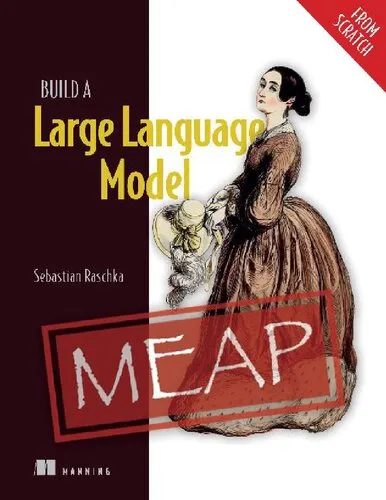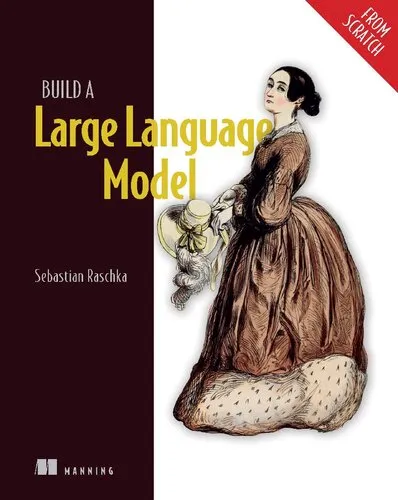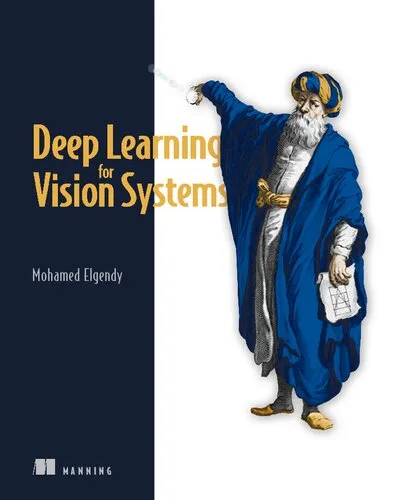Neural Cell Behavior and Fuzzy Logic: The Being of Neural Cells and Mathematics of Feeling
4.0
بر اساس نظر کاربران

شما میتونید سوالاتتون در باره کتاب رو از هوش مصنوعیش بعد از ورود بپرسید
هر دانلود یا پرسش از هوش مصنوعی 2 امتیاز لازم دارد، برای بدست آوردن امتیاز رایگان، به صفحه ی راهنمای امتیازات سر بزنید و یک سری کار ارزشمند انجام بدینکتاب های مرتبط:
معرفی کتاب "Neural Cell Behavior and Fuzzy Logic: The Being of Neural Cells and Mathematics of Feeling"
کتاب "Neural Cell Behavior and Fuzzy Logic: The Being of Neural Cells and Mathematics of Feeling" یک مطالعهی عمیق و بینرشتهای است که به رفتار سلولهای عصبی، منطق فازی و تأثیرات متقابل میان زیستشناسی عصبی و ریاضیات میپردازد. نویسندگان کتاب، Uziel Sandler و Lev Tsitolovsky، تلاش دارند تا مرزهای دانش بشر در حوزهی Neurobiology و Computational Mathematics را گسترش دهند.
خلاصهای جامع از کتاب
محتوای این کتاب در سه بخش اصلی متمرکز است: درک رفتار سلولهای عصبی، کاربرد منطق فازی برای شرح فرآیندهای شناختی و احساسی، و یافتن ارتباط میان ساختارهای زیستشناختی و عملکرد ریاضیاتی. نویسندگان در این کتاب، نظریهای بنیادین برای توضیح احساسات و رفتار ذهن ارائه میکنند، که بر پایه منطق فازی بنا شده است. با رویکردی جامع، کتاب رفتار سلولهای عصبی را به عنوان یک سیستم تطبیقی پیچیده توصیف میکند که به سرعت به ورودیهای خارجی واکنش نشان میدهد و در عین حال تصمیمات دقیق و بهینه میگیرد.
این اثر علمی همچنین نگاهی نو به مفهوم "Mathematics of Feeling" دارد، جایی که نویسندگان تلاش میکنند احساسات و عواطف انسانی را به صورت مدلهای ریاضیاتی تحلیل کنند. این نوآوری، درک ما را از عملکرد مغز و ایجاد احساسات انسانی تقویت میکند و مسیرهایی جدید برای تحقیقات آینده فراهم میآورد.
نکات کلیدی
- شناخت مدلهای ریاضی پیچیده برای تحلیل رفتار سلولهای عصبی.
- کاربرد منطق فازی در توضیح فرآیندهای احساسی و شناختی.
- فراهم کردن ابزارهای علمی و نظری برای پژوهشهای Neuro-Mathematical.
- ارائه دیدگاههای نوین برای متحد ساختن دنیای زیستشناسی عصبی و علوم ریاضی.
نقلقولهای معروف از کتاب
"The complexity of neural cell behavior is not chaos; it is the harmony of adaptation and learning."
"Mathematics begins where emotions find their precision."
چرا این کتاب اهمیت دارد؟
این کتاب به دلیل دیدگاههای نوآورانه و میانرشتهای خود، راههای تازهای برای درک رفتار عصبی و Feeling فراهم میآورد. کاربرد مفاهیم منطق فازی و مدلهای ریاضیاتی، حوزههای علمی را به یکدیگر نزدیکتر میکند و ابزارهای جدیدی برای پژوهشگران در علوم عصبی و Computational Mathematics مهیا میسازد. اگر به دنبال ترکیبی از زیستشناسی، ریاضیات و فلسفهی احساسات انسانی هستید، این کتاب یک منبع بینظیر برای اکتشاف است.
Introduction
Welcome to the fascinating exploration of neural cell behavior and the profound interplay between biology, consciousness, and mathematics. "Neural Cell Behavior and Fuzzy Logic: The Being of Neural Cells and Mathematics of Feeling" takes you on an intellectual journey that examines the intricacies of neural function and the theoretical frameworks—like fuzzy logic—that allow us to analyze the intangible aspects of feeling and cognition. Written by Uziel Sandler and Lev Tsitolovsky, this multidisciplinary work bridges the divide between neuroscience, artificial intelligence, mathematics, and philosophy, presenting a holistic view of how neural cells operate and interact to shape the experience of life itself. This carefully crafted book is an essential read for those curious about the intersection of science and speculation.
Detailed Summary of the Book
At its core, "Neural Cell Behavior and Fuzzy Logic" delves into the mysterious and dynamic world of neural systems. The authors move beyond traditional, reductionist approaches to neuroscience, challenging readers to view the brain as a series of interconnected systems capable of uncertainty, adaptability, and emotional processes. The book introduces the concept of fuzzy logic—a departure from the binary systems often used to model computation and decision-making—and applies it to the regulation of neural cell behavior.
Through a careful analysis of biophysical processes, such as signal transduction and the functioning of synaptic networks, the book reveals how cellular behavior mirrors broader cognitive and emotional systems. This leads to an exploration of what it means to "feel" and how feelings may stem from the interplay of deterministic and probabilistic phenomena. The authors connect traditional scientific paradigms with philosophical questions, offering a deeper understanding of how precise biological mechanisms such as protein synthesis or energy consumption contribute to subjective human experience.
With clear mathematical models and theoretical frameworks, the book also opens up new horizons for research in both neuroscience and the development of artificial neural networks (ANNs). It argues that understanding fuzzy systems and uncertainty is key to constructing better AI systems that emulate human thought and emotion. Ultimately, this book is not just about neural cells; it is about redefining what it means to understand life, intelligence, and emotion.
Key Takeaways
- A nuanced understanding of fuzzy logic and its application to neural cell behavior and emotional processes.
- Insights into the biological mechanisms underlying cognition and emotion.
- A framework for integrating neuroscience, artificial intelligence, and philosophy.
- Case studies and examples of neural behavior models, presented alongside mathematical theories.
- Groundbreaking ideas for future research in neuroscience and AI systems that mimic human cognitive and emotional processes.
Famous Quotes from the Book
“The neural cell is not merely a biological component; it is a metaphysical mirror of the universe’s complexity, capable of rationality and irrationality alike.”
“Mathematics of feeling is no contradiction—it is an attempt to quantify the unquantifiable, an exploration of the boundary between certainty and ambiguity.”
“In the gaps between binary states, between yes and no, life finds its meaning through uncertainty.”
Why This Book Matters
In an era when neuroscience and artificial intelligence are evolving at unprecedented rates, this book provides a critical lens through which to examine what it truly means to replicate and understand cognitive phenomena. The fusion of the biophysical, mathematical, and philosophical dimensions of neural behavior ensures the book's relevance across multiple disciplines. Whether you are a neuroscientist, mathematician, computer scientist, or a philosopher, the ideas presented in this book challenge basic assumptions and invite you to think about intelligence and emotion in a new way.
Furthermore, the use of fuzzy logic as a theoretical framework mirrors the complexity of modern life, where decisions are rarely black and white. By applying such models to biology and AI, the authors also shed light on ethical considerations in developing systems that could one day mimic or surpass human thought processes. As humanity stands at the threshold of profound advances in both neuroscience and artificial intelligence, this book is a timely contribution to the conversation.
"Neural Cell Behavior and Fuzzy Logic" is more than a study of the brain—it is a manifesto for the modern scholar driven by curiosity, interdisciplinary thinking, and a desire to bridge the gap between science and philosophy.
دانلود رایگان مستقیم
شما میتونید سوالاتتون در باره کتاب رو از هوش مصنوعیش بعد از ورود بپرسید
دسترسی به کتابها از طریق پلتفرمهای قانونی و کتابخانههای عمومی نه تنها از حقوق نویسندگان و ناشران حمایت میکند، بلکه به پایداری فرهنگ کتابخوانی نیز کمک میرساند. پیش از دانلود، لحظهای به بررسی این گزینهها فکر کنید.
این کتاب رو در پلتفرم های دیگه ببینید
WorldCat به شما کمک میکنه تا کتاب ها رو در کتابخانه های سراسر دنیا پیدا کنید
امتیازها، نظرات تخصصی و صحبت ها درباره کتاب را در Goodreads ببینید
کتابهای کمیاب یا دست دوم را در AbeBooks پیدا کنید و بخرید
1305
بازدید4.0
امتیاز0
نظر98%
رضایتنظرات:
4.0
بر اساس 0 نظر کاربران
Questions & Answers
Ask questions about this book or help others by answering
No questions yet. Be the first to ask!















